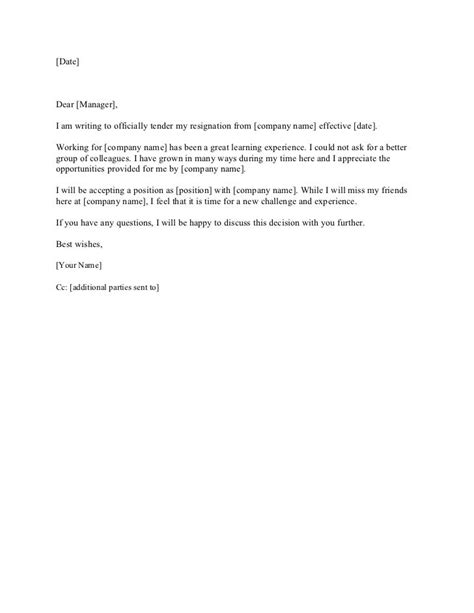Tendering Your Resignation: Examples & Guide

Resigning from a job can be a tough decision to make, but sometimes it’s necessary to move on to new opportunities or to address issues in your current workplace. Tendering your resignation is a process that requires careful planning and execution to ensure a smooth transition for both you and your employer. In this guide, we will provide examples and a step-by-step process for tendering your resignation.
Reasons for Resigning
There are many reasons why someone might decide to resign from their job. Some common reasons include:
- Personal or family reasons
- Better job opportunities
- Career growth or advancement
- Unhappy with current job or company culture
- Health issues
- Difficulty balancing work and personal life
Assessing Your Decision to Resign
Before tendering your resignation, it’s important to assess your decision and make sure it’s the right choice for you. Consider the following:
- Will resigning help you achieve your long-term career goals?
- Have you tried to resolve any issues with your employer or HR?
- Do you have another job or plan in place before resigning?
- Will resigning have a negative impact on your finances or personal life?
Preparing to Tender Your Resignation
Review Your Employment Contract
Before tendering your resignation, review your employment contract to ensure that you comply with any notice requirements or other obligations. Some contracts may require a certain amount of notice or specify how resignation should be communicated.
Consider Your Timing
Consider the timing of your resignation and how it will impact your employer. Avoid resigning during busy periods or when your employer is short-staffed. Try to give your employer as much notice as possible to allow for a smooth transition.
Prepare a Resignation Letter
A resignation letter is a formal document that communicates your decision to resign and provides details on your last day of work. It’s important to keep your resignation letter brief and professional. You can include the following:
- Date of letter
- Your name and address
- Name and address of employer
- Date of resignation
- A brief statement of your decision to resign
- A statement of appreciation for the opportunity to work for the company
- Assurance of your commitment to completing any outstanding work and ensuring a smooth transition
- Your contact information for future communication
Tendering Your Resignation
Arrange a Meeting with Your Manager
Arrange a meeting with your manager to tender your resignation. It’s best to do this in person, if possible, and follow up with a written resignation letter. During the meeting, be honest and professional about your decision to resign. Provide your manager with a copy of your resignation letter and discuss any outstanding work or projects that need to be completed before your departure.
Be Prepared for a Counter-Offer
Some employers may try to retain valuable employees by offering a counter-offer. Be prepared for this possibility and consider your options carefully. Think about why you decided to resign in the first place and whether a counter-offer will address your concerns.
Stay Positive and Professional
Regardless of your reasons for resigning, it’s important to stay positive and professional throughout the resignation process. Avoid speaking negatively about your employer or colleagues and focus on the positive experiences and skills you gained during your time with the company.
FAQs
How much notice should I give before resigning?
Check your employment contract for any notice requirements. If there are none, it’s generally recommended to give at least two weeks’ notice.
Should I provide a reason for my resignation?
You are not required to provide a reason for your resignation, but it may be helpful for your employer to understand why you are leaving.
What should I do if my employer offers a counter-offer?
Consider your options carefully and think about why you decided to resign in the first place. If the counter-offer addresses your concerns and aligns with your long-term career goals, you may want to consider accepting it. However, if your reasons for resigning are not addressed by the counter-offer, it may be best to decline.
Can I retract my resignation?
It depends on your employer’s policies and the timing of your retraction. If your employer has already made arrangements for your departure, it may be difficult to retract your resignation. It’s best to discuss your options with your employer as soon as possible.
What should I do if my employer reacts negatively to my resignation?
Stay positive and professional, even if your employer reacts negatively to your resignation. It’s important to maintain a good relationship with your employer and colleagues, as they may be valuable contacts in the future.
Conclusion
Tendering your resignation is a process that requires careful planning and execution. By assessing your decision, reviewing your employment contract, and preparing a resignation letter, you can ensure a smooth transition for both you and your employer. Remember to stay positive and professional throughout the resignation process, regardless of your reasons for leaving.
